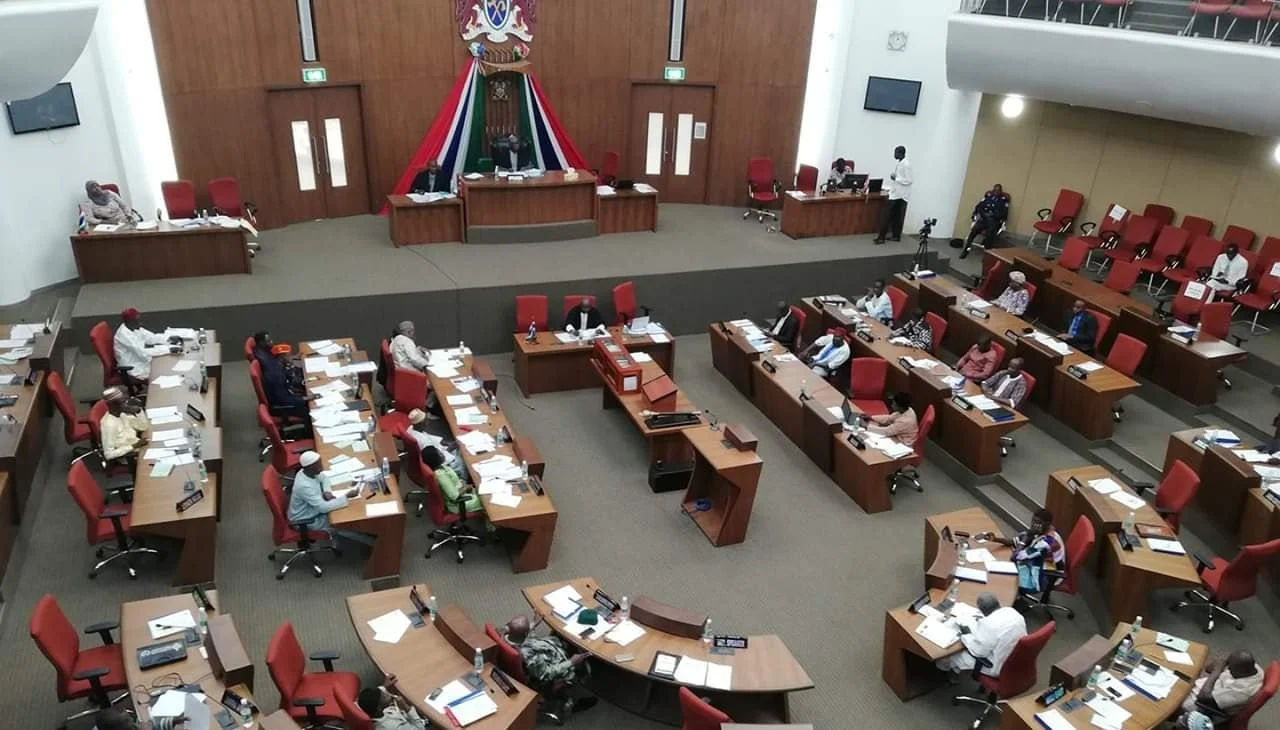On 1 December 2016, Gambia held a presidential election in which former President Jammeh (who had been in power for 22 years) lost to the opposition coalition candidate Adama Barrow. Initially, Jammeh accepted the results on 2 December only to reverse his position a week later, refusing to step down thereby plunging the country into an unprecedented political stalemate. The about-turn generated widespread local and international criticism, and started a flurry of diplomatic negotiations by ECOWAS. On 17 January 2017, the Alliance for Patriotic Reorientation and Construction (APRC) dominated National Assembly approved a state of emergency declared by the President a day before, and extended the term of the Parliament and the presidency by 90 days.
In response to the recalcitrant position of Jammeh, ECOWAS mobilized troops with the mandate to enter the country and forcefully oust the former President in case the diplomatic missions failed. Consequently, Barrow was sworn in as President on 19 January 2017 at the Gambian Embassy in Dakar, Senegal. Shortly after, a coalition of forces from five ECOWAS countries entered The Gambia stopping before the capital to finalize a diplomatic push for Jammeh’s exit. Two days later, Jammeh, after having looted the state’s coffers, finally succumbed to diplomatic pressure and left The Gambia for Equatorial Guinea. On 26 January 2017, The Gambia’s new president, Adama Barrow returned to the country amidst widespread celebrations.
The 1997 Constitution and potential reform areas
The Gambia adopted its second republican constitution in 1997 following a referendum held on the draft constitution on 8 August 1996. President Jawara of the People’s Progressive Party (PPP) had dominated political life from pre-independence to 22 July 1994 when a coup d’état led by Yahya Jammeh, a young army lieutenant, overthrew his government. The coup d’état brought to an end the longest surviving multiparty democracy in Africa.
The Constitution recognises The Gambia as a sovereign secular republic. It is premised on the principles of separation of powers, rule of law and respect for fundamental human rights. However, trends in The Gambia characterized by the complete disregard for the rule of law and the personalization of the state by former President Jammeh over the past two decades, posed a clear and present danger to the full realization of the Constitution.
Not only was the former regime notorious for the disregard of the rule of law, but Jammeh further distinguished himself by a number of amendments to the supreme law with largely anti-human rights and undemocratic provisions, such as the removal of the two-term limit and sweeping reforms to the electoral law which required heavy financial deposits for Presidential and National Assembly candidates. Naturally, the new government has promised and has actually started the process of sweeping legal and institutional reforms, including repeals or amendments of several laws from the Jammeh era that eroded human rights.
1. Electoral Reforms
Section 26 of the Constitution guarantees citizens the right to make political choices, providing for free, fair and regular elections, and permitting qualified citizens to vote and stand for public office. On 28 February 2017, the National Assembly passed the Elections (Amendment) Bill 2017 “to encourage the widespread participation of the ordinary citizenry in the new democratization dispensation.” The Interior Minister noted that salaries of most Gambians are low, and the revenue that is derived from commercial activities is equally very low.
The amendment was a response to the major shrinking of the political space during Jammeh’s era. In July 2015, the Elections (Amendment) Act, 2015 was passed and signed by the President on 20 July 2015. The number of signatures needed to register a political party was increased from 500 to 10,000 registered voters with at least 1,000 from each of the administrative areas, in addition to the requirement that a party post a deposit of more than D 1 million (USD 24,000). Candidates for President were required to pay D 500,000 (approximately USD 12,500) raised from D 10,000 (approximately USD 250); the fee for candidates for the National Assembly was increased from D 5,000 (approximately USD 125) to D 50,000 (approximately USD 1,000) and candidates for local council office were to pay D 10,000 (about USD 200). Opposition political parties not only regarded the increases as unreasonably high but also as a ploy by the government to drastically limit the participation of the opposition in elections. The basic salary for an average government employee in The Gambia is D3000. Thus the exorbitant fees were clearly intended to discourage multiparty democracy as most people wouldn’t be able to contest without patronage and financial support from the ruling party.
Now, the 2017 amendment reduces the exorbitant fees back to their initial amounts: President D10,000, National Assembly D5000 and other categories to D2500 and D12500 respectively.
2. Change of retirement age and removal of upper age limit for holding office as President
On the same day of the amendment of the Elections Act, the National Assembly also passed the Constitution (Amendment) Bill 2017 introduced by the Interior Minister on behalf of the President. The Bill amends section 141(2)(b) of the Constitution in extending the age at which a Supreme Court judge should vacate his or her office from seventy to seventy-five years. In addition, the amendment also removes the upper age limit of sixty-five for holding office as President provided under section 62(1)(b). According to the Interior Minister, the amendments were an attempt to ensure that competent and experienced Supreme Court judges and politicians will not be forced out of office in light of the limited number of qualified judges and political leaders.
However, the process for amendment by government was erroneous as they didn’t follow the proper procedures. In a televised statement, the Minister for Justice and Attorney General Tambedou advised President Adama Barrow not to sign the two recently amended constitutional provisions. Minister Tambedou believed “that the procedure adopted at the National Assembly to amend these constitutional provisions was misconceived. The process of amendment of the constitutional provisions should have been guided by Section 226 of the Constitution instead of Section 101 which was the procedure used at the National Assembly.” As the applicable amendments deal with sections 62(1)(b) and 141(2) of the Constitution which are not entrenched provisions, they fall within the ambit of section 226(2). The section provides that before a Bill for amendment is presented for first reading, it must be published in at least two issues of the Gazette, the latest publication being not less than three months after the first. The Bill should also be introduced into the National Assembly not earlier than ten days after the latest publication and must be supported on the second and third reading by votes of not less than three quarters of all the National Assembly Members. This procedure was not followed.
The Minister took full responsibility for the error and promised to take actions to remedy the situation as well as avoid such occurrence in the future. He further underscored the urgent need to do a comprehensive review of the Constitution. This public apology and acceptance of responsibility showed the Government’s responsiveness to the concerns of citizens who lamented the non-adherence to the constitutional procedures in passing the amendments.
Other immediate potential reform areas for the government:
3. Introduction of presidential term limits
The issue of term limits is not stipulated in the 1997 Constitution. Currently, The Gambia and Togo remain the only two countries in West Africa without presidential term limits. When the issue was brought up at the ECOWAS Heads of State Summit in 2015, the two countries refused to agree to the plan of restricting West African presidents to two terms in office. This led to the abandonment of the idea by the sub-regional body.
The absence of term limits enabled ex-president Jammeh to stand and win elections four consecutive times and even to seek a fifth term unsuccessfully in December 2016. It further provided him the opportunity to misrule the country and govern horribly against his people for twenty-two years.
According to Memorandum of Understanding (MOU) of the Coalition, one of the key goals of the Coalition government is the institutionalization of term limits. There is an urgent need for an amendment to include a two-term limit of 5 years. In assuring Gambians that his government will introduce a two-term limit of 5 years, President Barrow stated that "with term limits, any president that comes will serve appropriately and have respect for the laws of the land because the person will know that there is an end to his or her tenure."
4. Media law reforms
Section 25 of the Constitution guarantees a wide range of rights, including freedom of speech and expression, and freedom of thought, assembly, and association. Under President Jammeh’s rule, the environment in which the media operated was a precarious one characterized by draconian laws and arbitrary arrests, detentions, and physical assaults against journalists, as well as by closure and burning down of media houses.
As a dictator, Jammeh stifled the independent media. This was done through several changes which occurred including amendment to section 52 of the Criminal Code (Amendment) Act 2004 making any written or verbal statement that is critical of the government an offence; the offence of publishing false news with intent to cause fear or alarm to the public; the Information Act (amended) 2013 that provided a 15-year jail term for any person found guilty of using the internet to spread ‘false news’ about the regime or public officials. The amendment also imposed a fine of D 3 million (approximately USD 86,000) on persons found guilty of publishing ‘false news’ online against the regime or public officials.
There are several problems with such provisions, including the difficulty of distinguishing between fact and opinion; the chilling effect of such provisions have upon freedom of expression; and the fact that they do not serve any legitimate purpose which would justify restricting freedom of expression.
In addition to repealing these laws, a new Freedom of Information Act should be enacted to ensure the right to free speech and independence of the media. This will be in line with the promises made by the Justice Minister to make reforming media laws a priority. This will also guarantee the protection of press freedom which is vital to establishing and maintaining an open and democratic society in The Gambia.
Conclusion
We, Gambians fought against dictatorship because we wanted change: our rights and dignity restored. The hallmark of that dictatorship was the constant abuse of power through the blatant disregard for the rule of law as laid down in our Constitution. Going forward, Gambians must act as watchdogs to ensure respect for fundamental human rights by the government. It means also that every citizen must be a human rights defender or protector. Furthermore, this will also ensure efficient leadership and effective government that is responsive to our needs and accountable to the citizenry.
In order to ensure that our democratic aspirations are attained, there is need for the creation of a participatory platform between state and non-state actors to agree on set human rights-based goals and priorities which are underpinned by the rule of law, transparency, and accountability. The Gambia can provide a blueprint for democratic movements in Africa through its transition from dictatorship to democracy. For that to be possible, provisions in our Constitution that are repugnant to natural justice or at variance with international human rights law must be expunged or amended to fall in time.







